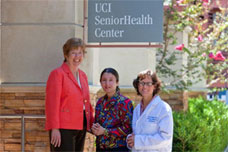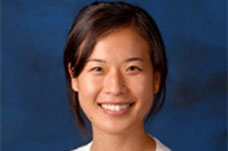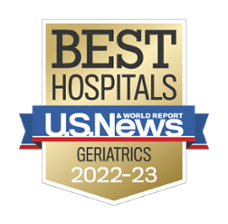
|
|
The Reynolds Grant Program
 The Program in Geriatrics has been awarded a $2-million, four-year grant from the Donald W. Reynolds Foundation to strengthen the education of UCI medical students in the care of older adults and ensure that our graduates meet national guidelines in geriatric patient care.
The Program in Geriatrics has been awarded a $2-million, four-year grant from the Donald W. Reynolds Foundation to strengthen the education of UCI medical students in the care of older adults and ensure that our graduates meet national guidelines in geriatric patient care.
We are committed to teaching UCI medical students how to build quality patient-doctor relationships as well as to gain the special skills and knowledge needed to deliver excellent geriatric care.
The Division of Geriatric Medicine & Gerontology is working with faculty members throughout the UCI Health School of Medicine to integrate geriatric medicine principles into the curricula, including medical and surgical subspecialties. New requirements include a geriatrics rotation for internal medicine interns, a geriatric anesthesia rotation for anesthesia residents, instruction in best practices for transition in patient care for hospitalist residents and didactics for emergency medicine residents.
Additional collaborations are underway in the following specialties: anesthesia, dermatology, emergency medicine, family medicine, geriatric oncology, internal medicine neurology, neurosurgery, ophthalmology and psychiatry.
Innovative Training Models
We also offer two innovative Reynolds grant programs that allow students to work with older patients: Medical Readers' Theater (MRT) and "Dementia Care: Bench to Community." The latter is a collaboration with the university's Institute for Memory Impairments and Neurological Disorders (iMIND) to bring the best clinical research to patients.
Third-year Family Medicine students put on a reader's theater in partnership with the Regents Point retirement community in Irvine. At first, students and Regents Point residents discuss issues of significance to both groups: aging, disability, memory loss, cognitive impairment, patient-doctor relationship, stereotyping of older patients, communication barriers, end-of-life issues and healthcare for individuals at this stage of life. Second, through the medium of theater, participants have the opportunity to reflect more deeply on their differing perspectives.
Each MRT session involves a participating geriatrician, eight to 10 medical students and interested Regents Point residents. A different group of third-year medical students attends the MRT session every four weeks. MRT, which gives students the opportunity to engage with the human side of medicine, is now a requirement of the Family Medicine clerkship program.
Regent Point discussions are facilitated by Dr. Johanna Shapiro, director of UCI's Program in Medical Humanities, and the attending geriatrician.
Understanding Dementia
The Dementia Care project, the first program of its kind, seeks to shape the education of physicians in training, allowing them to thoroughly experience the continuum of dementia care issues they will encounter in medical practice. Working in collaboration with iMIND, medical students are guided through clinical diagnostic work, basic science research, clinical trials, clinical-pathological case examinations and exploring community resources appropriate for varying levels of care.
 Wonita Youm, one of the first UCI medical students to complete the new educational module, found the program invaluable.
Wonita Youm, one of the first UCI medical students to complete the new educational module, found the program invaluable.
"It was truly a multidisciplinary cross-section of medicine - of how clinical methods, clinical research, lab-based research, and community groups all work cooperatively to support patients and their family members," Youm said. "Every person on these teams handled each patient with the greatest care and ensured that they received the best care, information and access to resources as possible."
Youm, now in her second year of medical school, says, "The experiences I gained will stay with me for the remainder of my career."
